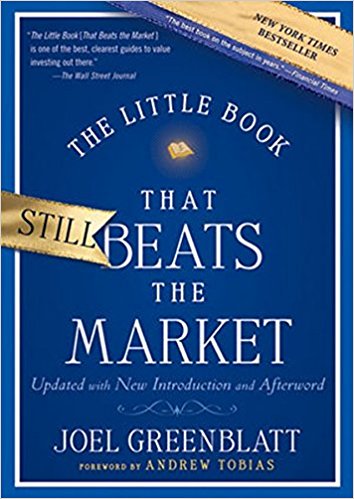The Little Book that Beats the Market Summary

<1 min read ⌚
 Stock market information is tough to grasp.
Stock market information is tough to grasp.
The same thing goes for value investing tips helpful for brokers, economist, and other law-abiding citizens.
We outline the book briefly, and present you the meaning of Benjamin Graham words: Just believe in magic!
Who Should Read “The Little Book that Beats the Market”? And Why?
So, which personality is the perfect fit to get the best out of Joel’s book?
Perhaps, the students.
The young adults with the sharpest mind and open mindset are the target group of the author who by the way doesn’t disregard any other social groups. His book is intended for all those motivated people, ready to indulge life by managing their money properly.
Economic crises and financial collapses play its part, but not taking a risk is also a risk. According to research, students are less aversive when it comes to investments than grown-ups. This mere fact acknowledges Joel’s theory that students can eager to understand many of the stock related mysteries.
About Joel Greenblatt
 Joel Greenblatt is an American-born author, investor, financier, hedge fund manager, and an academic. He was born to Jewish parents on December 13, 1957, in Great Neck, New York. Momentarily Joel works as an investor and adjunct professor at Columbia University Graduate School of Business.
Joel Greenblatt is an American-born author, investor, financier, hedge fund manager, and an academic. He was born to Jewish parents on December 13, 1957, in Great Neck, New York. Momentarily Joel works as an investor and adjunct professor at Columbia University Graduate School of Business.
Despite being a former executive at Alliant Techsystems, he established himself as a managing partner of one private investment company.
At Columbia University’s business school, he is highly appreciated for his efforts and willingness to educate people. He is the author of several books including You Can Be a Stock Market Genius; The Little Book that Beats the Market; and The Big Secret for the Small Investor.
“The Little Book that Beats the Market Summary”
For instance: Jason has developed one unique and ultra-effective business model. One young boy built a model of reliable foundations – profit-orientated. His everyday routine was composed out of purchasing several chewing gum packs for 25 cents each. Every package consists five same sticks of gum. Jason designed a “retail” business by selling his sticks of gum separately for 25 cents apiece, leading to a 1$ dollar profit on each pack.
If it sounds weird, you should be aware of the fact that before Jason finishes his high school education, can earn up to 3,000$ in profits just be re-selling gums.
Now, the real question arises!
Are you willing to invest in Jason’s company and would be his price? – Of course, you understand that Jason doesn’t have a company and this is a tricky question, not some straightforward matter.
It is vital to think about the actual value of Jason’s imaginary gum empire. You should learn how to manage your money properly and how does the stock market functions.
What are your thoughts on investing in Jason’s enterprise overall?
To own half of Jason’s company, you would have to pay 1,500$ right? Well, not exactly!
That price would only return the money to you. So, it is not logical that Jason would accept less, but the situation compels him to redefine his demands.
The stock market plays a different game, the real worth of something is defined by several factors, the most important among them all is Jason’s opinion about his chewing gum business. Shareholders must think and discuss various possibilities over and over again, only to understand the stock market a little better.
When you purchase a stock, you are purchasing a business, and now you are responsible as any other shareholder. Whether you make the right call, or not you’ll face the consequences of your decisions.
Every book has its “magic formula” capable of delivering the main point. The author Joel Greenblatt wanted to express the value of right investments in a transparent way. An attitude that enables each investor to affect and get the best out of the stock market.
Contradictory to many authors who focus on numerous investing formulas and strategies for financial success, Joel is unusually sincere in any stock related discussion in which, he clarifies the difficulty of beating the market.
According to some, the merit of Joel’s book doesn’t come from its financial formula for prosperity (which has its roots from Benjamin Graham’s commercial approach), but rather it is a guide, a step-by-step book ready to bring you closer to the fundamentals of investing.
Easy-readability must be an imperative for every author since Joel made this stock market book understandable for 10-year-olds.
Key Lessons from “The Little Book that Beats the Market”
1. High return on investment is crucial
2. Good Investor = Good Negotiator
3. Must be able to diversify your portfolio
High return on investment is crucial
Notice that Joel’s secret ingredients are: high return on investment (ROI) and high yearly income. This formula is applied by many small companies and large corporations. The stock market has to rank international companies according to their earnings yield and return on investment, for the people to have full access to all sorts of financial information.
Good Investor = Good Negotiator
An investor must be good at bargaining, in fact, that is the whole process of being an investor. If you also want to become a shareholder, you should assess company’s capabilities on a long-run.
Is your targeted business a high return on investment opportunity?
Buying a good business means performing a satisfying bargain; paying the lowest amount of money possible for the highest ROI.
Must be able to diversify your portfolio
You got what it takes? If so, you’ll quickly be able to earn more and more as time passes; The core of a good investment is diversification of money. Invest in businesses of different industries, and become a notable shareholder with lots of influence in the business sphere.
Like this summary? We’d Like to invite you to download our free 12 min app, for more amazing summaries and audiobooks.
“The Little Book that Beats the Market” Quotes
Choosing individual stocks without any idea of what you're looking for is like running through a dynamite factory with a burning match. You may live, but you're still an idiot. Share on X Graham figured that always using the margin of safety principle when deciding whether to purchase shares of a business from a crazy partner like Mr. Market was the secret to making safe and reliable investment profits. Share on X if you just stick to buying good companies (ones that have a high return on capital) and to buying those companies only at bargain prices (at prices that give you a high earnings yield), you can end up systematically buying many of the… Share on X Over the short term, Mr. Market acts like a wildly emotional guy who can buy or sell stocks at depressed or inflated prices. Share on X Although over the short term Mr. Market may price stocks based on emotion, over the long term Mr. Market prices stocks based on their value Share on XOur Critical Review
“The Little Book that Beats the Market” is an interesting, engaging and conventional work with lots of examples intended to answer all your questions, clarify your financial mysteries and deal with the uncertainty of the stock market that intrigues the people.








